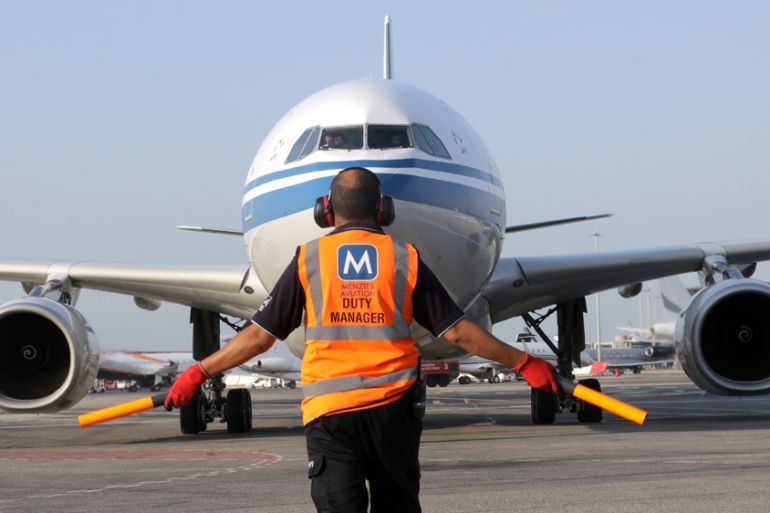Planes to cheeses: WTO approves US tariffs on $7.5bn of EU goods
Diplomats warn that the World Trade Organization award in the dispute could fuel rising trade tensions.

The United States has won approval to impose tariffs on $7.5bn worth of European goods over illegal European Union subsidies handed to Airbus, threatening to trigger a tit-for-tat transatlantic trade war as the global economy falters.
The decision by the World Trade Organization (WTO) on Wednesday pushes a 15-year corporate dispute over illegal support for transatlantic plane giants to the centre of caustic world trade relations – and it comes on top of a tariff war between Washington and Beijing.
Keep reading
list of 4 itemsPolitics and convenience drive Mexico to be US’s top trading partner
Will Xi and Biden mend US-China relations at the APEC summit?
UK warns of Russia laying ‘sea mines’ to deter Black Sea cargo ships
The European Commission said in response that a US move to impose trade sanctions on EU imports would be “short-sighted and counterproductive” and risked causing damage on both sides of the Atlantic.
The WTO has found that both Europe‘s Airbus and its US rival Boeing received billions of dollars of illegal subsidies in the world’s largest corporate trade dispute, a legal marathon dating back to 2004.
The two cases are expected to lead to tit-for-tat tariffs, beginning with the US measures, posing new problems for businesses and financial markets around the world.
Robert Scott, a senior economist at the US-based Economic Policy Institute, says the new tariffs are unlikely to have the desired effects.
“We’ve got tariffs on over $200bn in goods from China, approaching about $300bn in tariffs, on approximately $100bn on steel, on aluminium imports, and yet the US trade deficit keeps growing,” Scott told Al Jazeera. “It went up 10 percent last year, much faster than overall GDP. So the tariffs are not an effective strategy for bringing down our deficit with the rest of the world.”
The focus of nervous markets will now shift to Washington, DC, where the US Trade Representative is expected to move quickly to narrow down a preliminary list of goods in line for tariffs, a US source said.
The agency’s provisional list of products that are eligible to be targeted with tariffs ranges from Airbus jets themselves to helicopters, wine, handbags and cheese.
Before any tariffs can be imposed, the WTO’s Dispute Settlement Body (DSB) must formally adopt the arbiters’ report in a process expected to take between 10 days and four weeks.
The DSB’s next scheduled meeting is on October 28, but Washington could request a special meeting 10 days after the arbiters’ report is published, suggesting an earliest possible final nod on October 12.
In the largest case ever handled by the WTO, Washington had requested permission to impose tariffs on up to $11.2bn of EU goods.
Brussels is pushing for tariffs of about $10bn on US goods in a parallel process to be decided by the WTO early next year.
On Tuesday, the head of Irish budget airlines group Ryanair urged the US and EU to pull back from the brink of a tariff war and said neither side’s aviation industry would survive a long dispute.
But Peter Harrell, an adjunct senior fellow at the Washington-based Center for a New American Security, saw no immediate peace deal.
“My sense is that there will be a settlement only after both sides have imposed tariffs on each other,” he said.
Fragile markets
While the level of tariffs amounts to less than three days’ worth of annual trade between Europe and the US, importers led by US airlines that buy Airbus jets have urged Washington to be selective when choosing industries to hit in order to avoid causing collateral damage to the US economy.
The WTO award in the dispute could fuel rising trade tensions, diplomats say.
EU manufacturers are already facing US tariffs on steel and aluminium and a threat from US President Donald Trump to penalise EU cars and car parts. The EU has in turn retaliated.
The Trump administration has concluded tariffs were effective in bringing China to the negotiating table over trade, and in convincing Japan to open its agricultural market to US products.
Washington is unlikely to skip the opportunity to implement tariffs in the case over aircraft subsidies, according to current and former US officials.
Airbus has said this would lead to a “lose-lose” trade war, and the company has published a video stressing its contribution to the US industry through local assembly plants and 4,000 direct jobs, headlined “Together, let’s keep American aerospace great”.